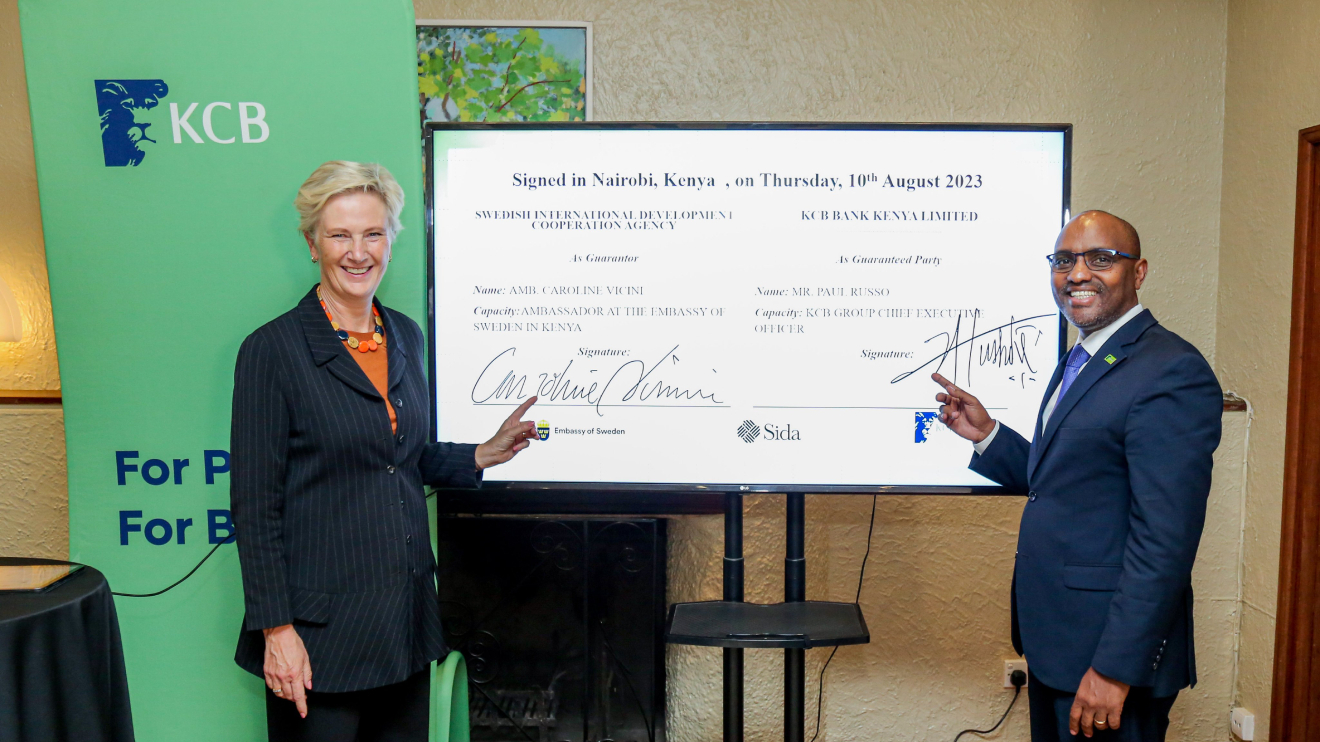KCB Bank Kenya has joined hands with the Swedish International Development Cooperation Agency (SIDA) in a groundbreaking agreement, aimed at providing a boost to small businesses in Kenya.
The agreement, valued at Sh1 billion, seeks to insure loans issued to small and medium-sized enterprises (SMEs), particularly those considered high-risk, in order to enhance their access to credit and facilitate their contributions to the nation's economy.
The seven-year guarantee facility, a collaborative effort between KCB Bank and SIDA, comes as a timely response to the challenges faced by SMEs in accessing financial resources.
Small businesses often encounter difficulties in obtaining loans due to perceived risks associated with their ventures.
This innovative partnership aims to address this gap and encourage SMEs to take full advantage of KCB Bank's expanded range of SME financing options.
Read More
KCB KCB Group CEO Paul Russo noted the facility will diversify financing options whilst reducing collateral requirements
“We are excited about this new instrument as it offers us the flexibility to work with SMEs as it will diversify the financing options and reduce collateral requirements, enabling them to play a leading role in achieving socio-economic development,” Noted
Speaking on the significance of this development, Michael Kung’u, the Acting Director of Retail Banking at KCB Bank, expressed enthusiasm about the potential impact of the new instrument on SMEs and the broader economy.
"We are excited about this new instrument as it offers us the flexibility to work with SMEs and the refugee population in their ambitions to support their entrepreneurial journey," he stated.
The SME guarantee, according to Kung’u, is expected to diversify the financing resources available to small businesses and subsequently reduce the stringent collateral requirements often associated with traditional lending practices.
This move is anticipated to empower SMEs to actively contribute to economic and social development within the country.
Risk-sharing mechanisms have emerged as vital tools in addressing the gaps in knowledge and understanding faced by lenders.
These mechanisms enable financial institutions to expand their lending scope to segments that are usually considered higher risk, such as SMEs and refugee-owned businesses, while simultaneously mitigating potential risks.
The result is an enhanced capability for lenders to serve niche market segments effectively.
Caroline Vicini, the Swedish Ambassador to Kenya, highlighted the broader mission of SIDA's involvement.
She stated, "Sweden’s Development Cooperation through the Swedish International Development Cooperation Agency (SIDA) aims to create opportunities for better living conditions for people living in poverty and under oppression."
Vicini emphasised that this initiative signifies Sweden's commitment to innovative financing approaches that mobilise domestic resources and external private capital to benefit vulnerable communities in Kenya beyond traditional Official Development Assistance (ODA).
The collaboration between KCB Bank Kenya and SIDA underscores the shared goal of fostering economic growth, reducing inequalities, and promoting sustainable development.
Through this partnership, SMEs are poised to receive the much-needed support to thrive and contribute significantly to Kenya's economy.
In conclusion, the agreement between KCB Bank Kenya and SIDA ushers in a new era of financial inclusivity for SMEs, marking a critical step toward realising Kenya's economic potential and promoting equitable development.








-1757243598.jpg)
-1757244564.jpg)

-1757101509.jpg)